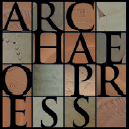
Publishing Scholarly Archaeology since 1997

Download Sample PDF
H 276 x W 203 mm
62 pages
24 figures
Published Aug 2023
Archaeopress Access Archaeology
ISBN
Paperback: 9781803275536
Digital: 9781803275543
Keywords
Saqqara; Religion; Ancient Egypt; Old Kingdom; Iconology; Iconography; Watetkhethor; Mereruka; Art; Ritual; The Divine Feminine; Gender; Panofsky; Material Engagement Theory
Related titles




Art as Ritual Engagement in the Funerary Programme of Watetkhethor at Saqqara, c. 2345 BC
Paperback
£22.00
Includes PDF
PDF eBook
(personal use)
Free Download
PDF eBook
(institutional use)
£9.99
Art as Ritual Engagement is examined through a case study of feminised funerary representation in the repertoire of Watetkhethor, an elite woman interred in the mastaba tomb of her spouse, Mereruka, at Saqqara, c.2345-2181 BCE.
Contents
Preface
Chapter 1: Introduction
Aims and Objectives
The role of visual culture in ancient Egypt
Contextualising the early 6th Dynasty: An Overview
Security and harsh men?
Archaeological Background: The Tomb of Mereruka
The Funerary Chambers of Watetkhethor
The Research Focus
Rationale: Why this study?
Contextualising terms: Art and Ritual
The Structure of the Study: Chapter Overview
Chapter 2: Literature Review
Early Perspectives
New Perspectives
Chapter 3: Methodology
Panofsky’s Iconological System
Malafouris’s Material Engagement Theory
Chapter 4: Art as Ritual Engagement
Watetkhethor as facilitator
Watetkhethor’s presence in Mereruka’s chambers
Watetkhethor and autonomous funerary cult
The Pillared Hall (B1)
The staircase in the chambers of Watetkhethor (B2)
The Serdab Room, B3, B4
The Burial Chapel, B5
Chapter 5: Study Synthesis
Looking forward: Art as Action, Art as Gendered
The limitations of this study
Directions for future research
Conclusion
Bibliography
About the Author
Barbara O’Neill completed an Mres (awarded with distinction) at the University of Winchester in 2015. This work focused upon ancient Egyptian offering tables scenes, particularly those assigned exclusively to women, in Old and Middle Kingdom Egypt (published with Archaeopress the same year). The author’s PhD research (2016-2021) carried out at the University of Winchester, centred on the role of the divine feminine in ancient Egyptian funerary art (University of Winchester). An MA in Egyptology (awarded with distinction) was completed online with the University of Manchester (2021) where the author was part of the first cohort of a Masters programme led by Professor Joyce Tyldesley.

 Add to wishlist
Add to wishlist
